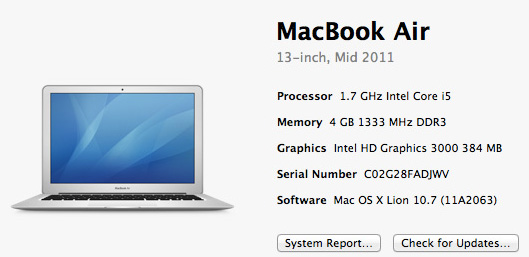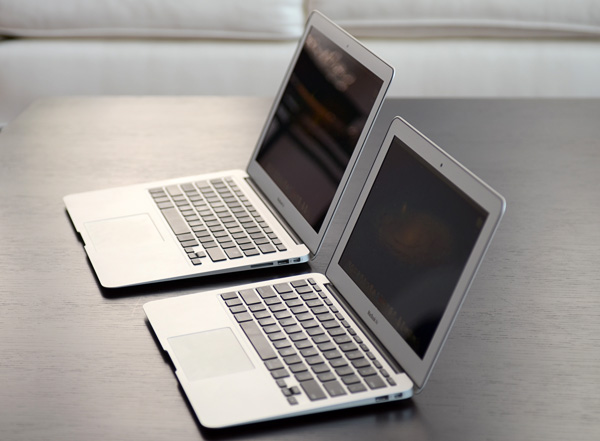The 2011 MacBook Air (11 & 13-inch): Thoroughly Reviewed
by Anand Lal Shimpi on July 28, 2011 3:25 AM EST- Posted in
- Apple
- Mac
- Intel
- Sandy Bridge
- MacBook Air
- Laptops
The CPUs
Like the iMac and MacBook Pro before it, Apple has blessed the MacBook Air with Intel's 32nm Sandy Bridge family of CPUs. Despite being named similarly to the Core i5/i7 in the MacBook Pro, only dual-core Sandy Bridge is offered in the MacBook Air. The cases are simply too small to accommodate any 32nm quad-core parts.

Also NVIDIA is completely out of the picture here. While the previous generation MacBook Air used an NVIDIA chipset with integrated GeForce 320M GPU, Apple is relying entirely on Sandy Bridge's processor graphics this round.
Apple opted for ultra low voltage Sandy Bridge CPUs all with a 17W TDP. The previous generation used a 10W part for the 11 and a 17W part for the 13, but remember those figures didn't include NVIDIA's GeForce 320M which is good for at least another 14W under load, and probably a watt or two with the GPU idle. The 17W SNB parts include memory controller and GPU, leaving only the chipset at 3.4W. Max power consumption is likely lower on the new MBAs, although typical power consumption could be higher as Sandy Bridge cores are significantly faster than the Core 2s used before.
There are three different CPUs Apple offers in the new MacBook Air lineup:
| 2011 Apple MacBook Air CPU Comparison | |||||
| 1.6GHz Core i5 | 1.7GHz Core i5 | 1.8GHz Core i7 | |||
| Available in | 11-inch (default) | 13-inch (default) |
high-end 11-inch (option) high-end 13-inch (option) |
||
| Intel Model | Core i5-2467M | Core i5-2557M | Core i7-2677M | ||
| Cores/Threads | 2/4 | 2/4 | 2/4 | ||
| Base Clock Speed | 1.6GHz | 1.7GHz | 1.8GHz | ||
| Max SC Turbo | 2.3GHz | 2.7GHz | 2.9GHz | ||
| Max DC Turbo | 2.0GHz | 2.4GHz | 2.6GHz | ||
| L3 Cache | 3MB | 3MB | 4MB | ||
| GPU Clock | 350MHz / 1.15GHz | 350MHz / 1.2GHz | 350MHz / 1.2GHz | ||
| Quick Sync | Yes | Yes | Yes | ||
| AES-NI | Yes | Yes | Yes | ||
| VT-x | Yes | Yes | Yes | ||
| VT-d | No | Yes | Yes | ||
| TDP | 17W | 17W | 17W | ||
All three parts support Hyper Threading and Quick Sync, although the latter remains mostly unused in OS X. The 11 comes with a 1.6GHz part by default while the 13 ships with a 1.7GHz chip. Both can be upgraded to the same 1.8GHz Core i7, a big change from last year's lineup where even the upgraded 11-inch model was slower than the base 13.
Turbo is fully supported at the default Intel ratios (more on confirming this later). This is actually a pretty big deal because it means that for single threaded applications you actually get similar performance to a MacBook Pro. It's only in the thread heavy stuff that the Pro machines will pull away.
The default chips for both systems comes with 3MB of L3 cache. The majority of quad-core parts only have 6MB of L3 and seem to do just fine, so I don't expect that this is too big of a deal. The upgraded 1.8GHz CPU comes with an extra MB of cache.
You'll see this in the performance section but there's just no comparison between the CPUs in the 2011 MacBook Air and what Apple shipped last year. If the MacBook Air wasn't fast enough for your last year, the 2011 models should change that.











103 Comments
View All Comments
netmask254 - Thursday, July 28, 2011 - link
It's really surprising to me that the huge random speed difference, and how can Apple tolerate such an inconsistent behavior among different machines? I heard that the buyer will randomly get a Sumsung or Toshiba SSD even for the same model, that's too bad. However, maybe most Apple users don't care about it or don't know it.beginner99 - Thursday, July 28, 2011 - link
Yeah, especially since you would actually pay an apple premium for knowing what you get. But then these are more priced like windows laptops so they probably had to lower some standards.The so called ultrabooks according to rumors might even be more expensive than MBA. IMHO especially the 256 GB version is a bargain (if you get the Samsung ssd). That alone costs you like 400$ if you would manually upgrade a cheap windows laptop.
Isn't the 4k random read the main thing that prevents stuttering issues ins ssd compared to hdds?
lyeoh - Thursday, July 28, 2011 - link
I think the stuttering is more to do with the max access latency.You could have a very fast drive that averages 100MB/sec over 1 minute, but if every 30 seconds it "hangs" for one second, you would notice it.
e.g. for one second your transfer rate drops to 0MB/sec, but for the other 29 seconds it transfers at 104MB/sec.
That's why many of those benchmarks don't tell you everything about how it feels.
Same goes for fps you could get 120fps but if what appears on the screen is actually delayed by a 100 milliseconds, it's worse than something that "only" does 60 fps with 5 millisecond delay.
Not many reviewers test for latency. Anandtech does have some latency tests for a few SSDs, but so far it does not appear to be a standard benchmark.
KPOM - Thursday, July 28, 2011 - link
Interestingly, on the MacRumors forum someone posted results of another benchmark that suggested that the Toshiba outperformed the Samsung on random reads and writes, though the Samsung outperform on sequential.http://translate.google.com/translate?u=http%3A%2F...
Anand says the Samsung outperforms on both. Note that this was also the case in the 2010s. Toshibas started shipping first, and Samsungs made their way into the system in January. Apple seems to have carried them over unchanged to the 2011. I wonder what impact supply chain issues (e.g. the tsunami) and legal issues (e.g. Apple's lawsuit against Samsung) have on their purchasing decisions?
fericia - Monday, August 15, 2011 - link
My wife's 13-inch one came with SM256...arthur449 - Thursday, July 28, 2011 - link
Light Web Browsing Battery Life13-inch MacBook Air (Mid 2011) - Core i5 2.7GHz
This message will self-destruct after reading.
Anand Lal Shimpi - Thursday, July 28, 2011 - link
Fixed :)Take care,
Anand
refresh_time - Thursday, July 28, 2011 - link
Thank you for a very in-depth review.I was ordered the i7 13" without needing the bigger ssd, but after reading this, I think i should exchange it for a i5 :D
All I wanted from i7 was video work on imovie but if there is only about a 10% gain in performance, I think I'm better with i5.. (right?)
But i read the mba review here (http://www.gadgetreview.com/2011/07/apple-macbook-... and they seem to recommend i7 highly. what do you think?
I'll use the return money to buy a 1tb hardrive and a nice sleeve
iwod - Thursday, July 28, 2011 - link
I think we need something thinner, lighter, and more size to choose from. Not everyone's home can fit a bloody 27" Monitor.ImSpartacus - Thursday, July 28, 2011 - link
Apple doesn't do low margin products.Even if they offered a 24" IPS panel with all the fixings, it would approach $500. It's hard to explain to a customer why they need to spend twice as much as a bargain bin 24" TN panel.
There aren't a lot of 1440p 27" monitors on the market today for less than $1000, so Apple doesn't run into any comparison problems. The camera, speakers and connectivity features are just gravy.